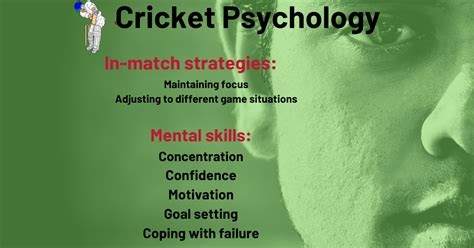Explore the crucial role of psychology in cricket performance, including mental resilience, visualization techniques, stress management, and the effects of team dynamics on players.In the highly competitive world of cricket, the mental game plays an equally crucial role as physical prowess. “Understanding the Mental Game: Cricket Psychology Explained” delves into the essential psychological aspects that can elevate a player’s performance on the field. From honing mental resilience to mastering visualization techniques, this article explores the importance of cricket psychology in optimizing player capabilities. Cricketers often face unique psychological challenges that can impact their performance, and understanding these hurdles is vital for success. We will also discuss effective coping strategies for stress management and the significant influence of team dynamics on a player’s mental state. Join us as we unravel the complex interplay between psychology and cricket, equipping players with the tools to navigate the mental landscape of this beloved sport.
The Importance of Cricket Psychology in Performance Enhancement
In the competitive arena of cricket, cricket psychology plays a pivotal role in achieving optimal performance. Players often understand the physical demands of the game, but it is the mental aspect that can fully determine success on the field. Here are several key reasons why cricket psychology is essential for enhancing performance:
- Focus and Concentration: Maintaining concentration during long match durations is critical. Cricketers who develop their mental focus can better handle pressure situations, such as during a tight finish or a crucial delivery.
- Confidence Building: A confident player is often a successful player. Techniques derived from cricket psychology can help players cultivate self-belief and a winning mindset, leading to improved performance.
- Pressure Management: In high-stakes matches, handling pressure can be challenging. Effective psychological strategies are vital for managing anxiety and performing well under pressure.
- Adaptability: The ability to adjust strategies and mental approaches in response to changing match conditions is crucial. Cricket psychology equips players with the tools to be mentally flexible and resilient.
- Goal Setting: Establishing clear, attainable goals is a fundamental principle of sports psychology. Players trained in cricket psychology learn to set and achieve measurable objectives that enhance their game.
Embracing cricket psychology fosters not only individual player growth but also strengthens team cohesion, contributing to overall performance enhancement on the field. As the game evolves, players who prioritize their mental skills alongside their physical training will likely find greater success and fulfillment in their cricketing careers.
Key Psychological Challenges Faced by Cricketers
Cricketers often face a variety of psychological challenges that can impact their performance on the field. These challenges stem from the high-pressure environment of the sport and can significantly affect a player’s mindset. Understanding these challenges is essential for developing effective strategies to enhance cricket psychology. Here are some of the key psychological challenges faced by cricketers:
| Psychological Challenge | Description |
|---|---|
| Performance Anxiety | The fear of not meeting expectations, which can lead to underperformance in crucial moments. |
| Self-Doubt | Questioning one’s abilities can erode confidence and prevent players from executing their skills effectively. |
| Pressure Management | Handling the pressure from fans, coaches, and teammates during important matches. |
| Injuries and Recovery | Dealing with the psychological effects of injuries, including fear of re-injury and frustration during recovery. |
| Maintaining Focus | Staying concentrated throughout the match, especially during long formats like Test cricket. |
Each of these challenges requires tailored approaches to enable players to perform at their best. Addressing these issues through professional support and mental conditioning can significantly improve their overall cricket psychology and subsequent on-field performance.
Techniques to Develop Mental Resilience in Cricket
Developing mental resilience is crucial for cricketers to perform consistently under pressure. Here are some effective techniques that can enhance players’ cricket psychology and help them build resilience:
Implementing these techniques can significantly enhance the mental toughness of cricketers, reinforcing their cricket psychology and equipping them to face challenges effectively on the field.
How Visualization Influences Cricket Psychology
In the realm of cricket psychology, visualization plays a crucial role in enhancing performance and building mental strength. This technique involves mentally simulating game scenarios, allowing players to rehearse skills and strategies in their minds before executing them in real life. Visualization not only helps in refining skills but also aids in reducing anxiety and boosting confidence.
One of the primary benefits of visualization is its ability to enhance focus. By mentally visualizing successful outcomes, cricketers can train their minds to concentrate better during high-pressure situations. This mental rehearsal instills a sense of familiarity, effectively preparing players for various match conditions.
Moreover, visualization can assist in managing the expectations and pressures associated with competitive cricket. Cricketers can visualize themselves overcoming challenges, which fosters a more positive mindset and improves their emotional regulation. This mental conditioning helps players to stay calm and composed when faced with critical moments during the game.
Incorporating visualization into daily practice routines can significantly impact a player’s approach to the game. Coaches can guide their teams to include visualization exercises, such as picturing successful shots or imagining the perfect delivery, particularly before matches. Such practices empower players to harness the full potential of cricket psychology, allowing them to approach competitions with greater assurance and clarity.
By prioritizing visualization techniques, cricketers can cultivate a stronger mental game, leading to improved overall performance on the field. This practice is not just beneficial for individual players but can positively influence team dynamics as well, as collective visualization can create a shared vision of success.
Coping Strategies for Stress Management in Cricket
Managing stress is critical for maintaining optimal performance in cricket. The high-pressure environment, whether during practice or in matches, can significantly impact a player’s mental state. Implementing effective coping strategies can help cricketers navigate these challenges and enhance their cricket psychology.
Here are some practical approaches to manage stress in cricket:
| Strategy | Description |
|---|---|
| Mindfulness Techniques | Practicing mindfulness helps players stay present and focused, reducing anxiety related to performance. |
| Routine and Rituals | Establishing pre-match rituals can create a sense of control and predictability, minimizing stress. |
| Physical Activity | Engaging in regular physical workouts aids in the release of endorphins, which can help combat stress. |
| Open Communication | Talking to teammates or coaches about stressors can create a support network and foster teamwork. |
| Goal Setting | Setting realistic and achievable goals can reduce the pressure experienced during matches. |
Incorporating these strategies not only enhances individual cricket psychology but also contributes to a healthier team environment. Each player should identify which techniques resonate with them personally, allowing them to cope more effectively with stress during their cricketing journey.
The Impact of Team Dynamics on Cricket Psychology
Understanding the dynamics within a cricket team is essential for comprehending how cricket psychology plays a significant role in performance. Team dynamics encompass interpersonal relationships, communication patterns, and the overall culture within the team, which can significantly affect players’ mental states.
When players are in a supportive and positive environment, they are more likely to experience heightened levels of confidence and motivation. Conversely, negative dynamics such as conflicts among players or a lack of camaraderie can lead to increased anxiety and stress, impacting their performance on the field.
One critical aspect is the role of leadership within a team. Captains and coaches who foster open communication and build strong relationships contribute positively to cricket psychology. They help in creating an atmosphere where players feel valued and understood, reducing performance anxiety.
Additionally, the reliance on teamwork in cricket creates a sense of belonging among players, which is essential for mental well-being. A strong team bond can act as a buffer against the challenges faced during high-pressure situations, allowing players to rely on each other for support and encouragement.
It is also vital to consider the impact of team performance on individual players. A team that consistently performs well can instill a sense of pride and positive reinforcement among its members. However, a struggling team may lead to self-doubt and decreased morale, highlighting the need for robust cricket psychology practices to navigate such periods effectively.
Nurturing healthy team dynamics is crucial for enhancing cricket psychology, contributing not only to individual player performance but also to the overall success of the team. Understanding these dynamics can help coaches and players implement strategies that foster unity and strengthen mental resilience on and off the field.
Frequently Asked Questions
What is cricket psychology?
Cricket psychology refers to the mental and emotional aspects that influence players’ performance, decision-making, and overall well-being during the game.
Why is mental conditioning important in cricket?
Mental conditioning is crucial in cricket because it helps players manage pressure, maintain focus, and stay resilient, which can significantly impact their performance on the field.
How do players improve their mental toughness?
Players can improve their mental toughness through various techniques such as visualization, mindfulness, setting specific goals, and practicing positive self-talk.
What role does confidence play in a cricketer’s performance?
Confidence plays a vital role as it can enhance a player’s ability to execute skills under pressure, take calculated risks, and bounce back from setbacks.
Can team dynamics affect individual performance in cricket?
Yes, team dynamics greatly influence individual performance, as a positive and supportive team environment fosters confidence and collaboration, while a toxic atmosphere can hinder performance.
What are common psychological challenges faced by cricketers?
Common psychological challenges include fear of failure, performance anxiety, overthinking, and the pressure of expectations from fans and coaches.
How can players use visualization as a tool in cricket?
Players can use visualization by mentally rehearsing their techniques, game scenarios, and successful performances, which can enhance their focus and prepare them for real-game situations.









